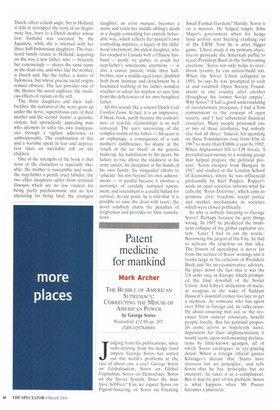Patent medicine for mankind
Mark Archer
THE BUBBLE OF AMERICAN SUPREMACY: CORRECTING THE MISUSE OF AMERICAN POWER by George Soros Weidenfeld, £12.99, pp. 207, ISBN 0297849069 jrudging from his publications, since semi-retiring from his hedge fund empire George Soros has sorted out the world's problems at the rate of about one a year: George Soros on Globalisation, Soros on Global Capitalism. Soros on Democracy, Soros on the Soviet System. Does the man have hobbies? Can we expect Soros on Pigeon-fancying, or Soros on Creating Small Formal Gardens? Hardly. Soros is on a mission. He helped topple John Major's government when his hedge fund activity sent Sterling crashing out of the ERM. Now he is after bigger game. 'I have made it my primary objective to persuade the American public to reject President Bush in the forthcoming elections.' Soros not only helps to overthrow tyrants; he can nation-build too. When the Soviet Union collapsed in 1991, he says he was 'prompted to rush in and establish Open Society Foundations in one country after another throughout the former Soviet empire'. Why Soros? 'I had a good understanding of revolutionary processes, I had a firm commitment to the concept of open society, and I had substantial financial resources. Many people possessed one or two of these attributes, but nobody else had all three.' Indeed, his spending on these Foundations rose from $3m in 1987 to more than $300m a year by 1992. When Afghanistan fell to UN forces, 'I provided seed money to a working group that helped prepare the political process'. Soros escaped from Hungary in 1947 and studied at the London School of Economics, where he was influenced profoundly by Karl Popper. Popper's work on open societies informs what he calls the 'Soros Doctrine', which aims to promote civic freedom, social justice and market mechanisms in societies which were closed politically.
So why is nobody listening to George Soros? Perhaps because he gets things wrong. In 1997 he predicted the imminent collapse of the global capitalist system. 'Later I had to eat my words.' Borrowing the jargon of the City, he had to activate the stop-loss on that idea. The frisson of apocalypse is never far from the surface of Soros' writings and it looms large in his criticism of President Bush and his neo-conservative advisers. He plays down the fact that it was the US arms race in Europe which prompted the final downfall of the Soviet Union. And Libya's abdication of nuclear weapons in the wake of Saddam Hussein's downfall comes too late to get a mention. As someone who has spent over $5bn in foreign aid, he talks sensibly about ensuring that aid, or the revenues from natural resources, benefit people locally. But his political proposals come across as hopelessly naive, dependent for their implementation, it would seem, upon well-meaning declarations by little-known quangos, all of which Soros catalogues in eye-glazing detail. When a foreign official quotes Kissinger's dictum that 'States have interests but no principles', and tells Soros that he has 'principles but no interests', he takes it as a compliment. But it may be part of his problem. Soros is what happens when Mr Pooter becomes a plutocrat.


















































































 Previous page
Previous page